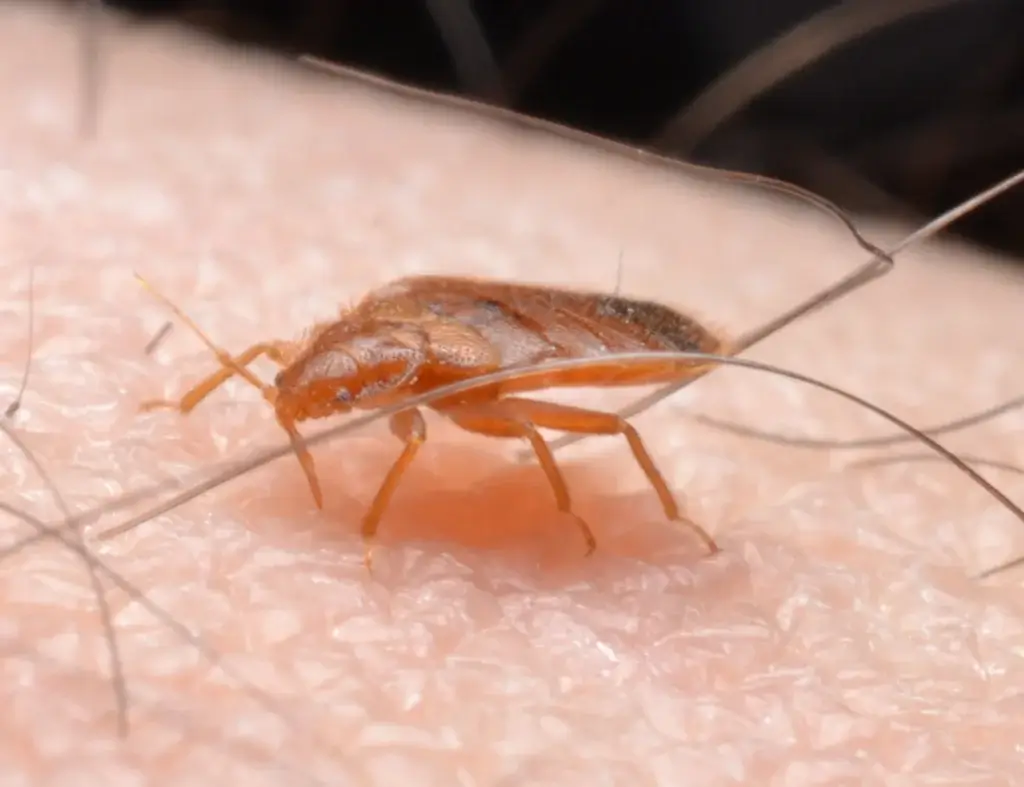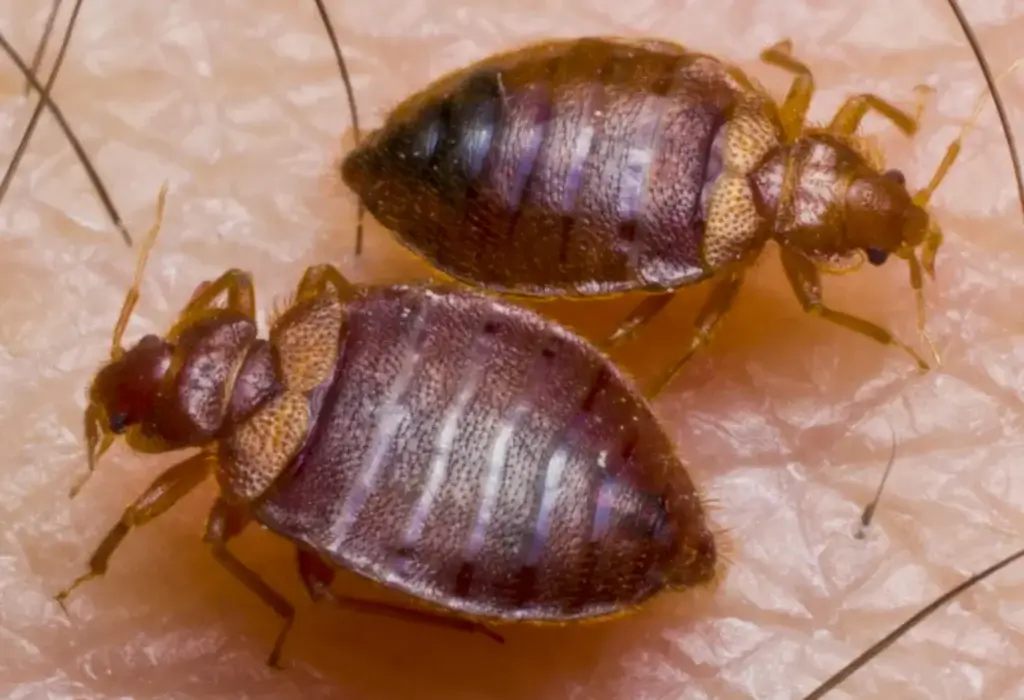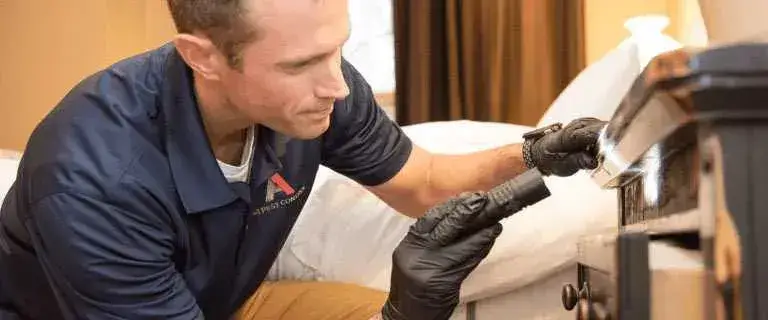
Identifying & Preventing Bed Bugs in North Carolina
Bed bugs (known scientifically as Cimex lectularius) love humans. They love us so much, that they live with us. In fact, you would be hard-pressed to find a bed bug that doesn't live in a man-made structure. This is because inside each and every one of us is the food source that bed bugs need to reproduce and survive: blood. Let's explore the reason bed bugs in North Carolina are an issue, how you can spot signs of a bed bug infestation, how to get rid of bed bugs, and when to call a bed bug exterminator.


Table of Contents
Habits & Patterns of Bed Bugs in North Carolina
Bed bugs are a nuisance around the world, but there are regional differences that can make them more prevalent and problematic in certain areas. Bed bugs in North Carolina are a problem due to the climate and population. Let's dissect what attracts bed bugs, when bed bugs are most active, and where they nest. If you're a resident of Lenoir, West Jefferson, Blowing Rock, Mooresville, Hickory, or surrounding areas in North Carolina, call our bed bug exterminators to remove or stop a bed bug infestation.
What Attracts Bed Bugs in North Carolina?
North Carolina residents enjoy warm summers - and we're not just talking about human residents. Bed bugs in North Carolina love warmth, humidity, and humans. Let's check out what attracts bed bugs in North Carolina.
Climate
While heat is one of the ways pest management professionals arrest bed bug infestations, it doesn't mean that bed bugs don't like the heat. When temperatures are in the 80s and 90s, bed bugs become extremely active. So, a hot North Carolina day will inspire these insects to get busy. This increases the likelihood that they will spread from one place to the next.
Transport
Bed bugs spread by passive dispersal. That is to say, they get into stuff that is transportable and are moved to a new location. They don't go from house to house or house to business on their own. So, during the warm months of the year, bed bugs spread more often. This increases the chance of someone bringing bed bugs into your home or business.
Humidity
Moisture can impact bed bugs and increase their activity, which increases how often they will spread. It is important, however, to understand that creating dry conditions inside a man-made structure is not an effective tactic for control of these insects. They can stay hydrated by feeding on blood. This is why bed bugs do just fine in dry climates such as those found in Nevada and Southern California. But, the humidity in North Carolina promotes bed bug activity.
When Are Bed Bugs in North Carolina Most Active?
When it is warm and moist, bed bugs that are inside structures that are not climate-controlled will be more active and get into more items that can be moved, but bed bugs can spread any time of year. They are an interior pest that spreads through human mechanical means. This makes them a constant problem in North Carolina.
At any point and at any time, bed bugs can find their way into your home or business. In a previous article, we gave some tips on what to do when you find bed bugs. There you'll be able to learn what bed bugs look like, where they prefer to hide, and what pitfalls you'll experience if you try to get rid of these tormenting pests on your own. It is definitely worth a read as a companion to this article. Here, we're going to focus on professional bed bug control.
Where Do Bed Bugs in North Carolina Nest?
When bed bugs get in, they can hide in a wide range of locations. Your bed bug exterminator, or pest management professional (PMP, knows where to look. A PMP is trained in entomological behavior patterns, as well as industry-leading pest management methods.
Control of bed bugs begins with a detailed inspection. Once potential trouble areas are cataloged, treatment options will be suggested.
How to Spot Signs of Bed Bugs in North Carolina
Detecting bed bugs early can prevent a larger infestation and make removal easier. If you believe you've identified signs of bed bugs, consider seeking professional pest control services to effectively address the issue. The A-1 Pest Control pest technicians know just how to handle bed bugs in North Carolina. But here are some signs of bed bugs that you can keep an eye out for:
1. Stains & Shedding
Inspecting your home for signs of bed bugs requires careful observation. Start by examining your bedding, mattresses, and box springs. Look for tiny reddish-brown bugs about the size of an apple seed, or even smaller, and their shed skins. Check the seams, folds, and crevices of your mattress and furniture, as these are common hiding spots for bed bugs. Another visual clue is small, dark fecal spots or stains on your sheets, pillows, or mattress, often resembling ink dots. Rusty or reddish stains can also indicate crushed bed bugs that have fed on blood.
2. Bites and Health Symptoms
While not a foolproof method, unexplained bites on your skin can sometimes be a sign of bed bugs. Bed bug bites often appear in clusters or a line and can be itchy or cause mild allergic reactions. However, bites alone are not enough evidence, as they can be confused with other insect bites or skin conditions. If you suspect bed bug bites, consider the broader context—such as finding other signs of infestation—to draw a more accurate conclusion.
3. Evidence of Nesting
Bed bugs are adept at hiding, but they leave behind signs of their presence. Look for evidence of nesting, such as small white eggs and tiny eggshells. These might be found in cracks and crevices near your sleeping area. Additionally, inspect any upholstered furniture, curtains, and baseboards. Keep an eye out for molting bed bug skins, as these insects shed their exoskeletons as they grow. Vacuuming your home thoroughly, paying special attention to seams and crevices, can help uncover these signs and reduce the bed bug population.
Getting Rid of Bed Bugs in North Carolina
Getting rid of bed bugs can be a challenging process that requires persistence and a combination of strategies. The most effective way to get rid of bed bugs is to contact a bed bug exterminator, but these additional methods can help prevent the spread or return. Combining these approaches with consistent monitoring can help ensure that your home becomes and remains bed bug-free.
1. Thorough Cleaning and Removal
The first step in eliminating bed bugs in North Carolina is to declutter and thoroughly clean your living space. Remove any unnecessary items, especially those that are near your sleeping area, as these can provide hiding spots for bed bugs. Wash your bedding, clothing, curtains, and any other fabrics in hot water, preferably above 140°F. High heat kills bed bugs and their eggs.
Vacuum all surfaces, including mattresses, box springs, furniture, and carpets, paying extra attention to seams, crevices, and cracks. Use a brush attachment to dislodge eggs and bugs from these hiding spots. After vacuuming, immediately seal and dispose of the vacuum bag or clean the canister to prevent the bugs from escaping.
2. Encase Mattresses and Furniture
Encasing your mattress and box spring in specially designed bed bug-proof covers can help contain the infestation. These covers are durable, hypoallergenic, and designed to trap any bed bugs already within, preventing them from feeding and eventually causing them to die.
Make sure the covers are labeled as "bed bug-proof" and keep them on for at least a year to ensure any trapped bugs die off.
3. Professional Treatment
While DIY methods can be effective, severe bed bug infestations require a bed bug exterminator. Pest control professionals have access to specialized treatments such as insecticides, heat treatments, and steam treatments that can effectively target and eliminate bed bugs at all life stages.
The exterminators at A-1 Pest Control are experienced in handling bed bug infestations. From university dorms to private residences, we provide subtle, discreet, and effective bed bug extermination services. If you've got bed bugs in North Carolina, call us immediately at 828-481-9140.
However, if you're not located in North Carolina or are outside of our local pest control service area, do your research before hiring a pest control company for bed bug removal. Make sure that the pest control company is experienced in dealing with bed bugs and uses safe and effective methods. Be prepared to follow their instructions for preparation before the bed bug treatment, which may involve moving furniture, vacuuming, and other tasks to maximize the effectiveness of the treatment.

Bed Bug Extermination Treatments
Exterminators deal with a bed bug infestation using chemical treatment methods. This requires multiple visits from a bed bug exterminator and an application of chemicals to key areas such as baseboards, floorboards, and walls.
Be aware that the use of chemicals within a home requires special training to ensure the protection of individuals, pets, and belongings. Professionals follow strict guidelines when applying these bed bug control measures. Don't trust your family's health and the safety of your property to an untrained and unlicensed person.
Got Bed Bugs in North Carolina? Call A-1 Pest Control.
Bed bugs in North Carolina can be a massive problem for you - and your neighbors. Get discreet bed bug extermination services in Lenoir, West Jefferson, Blowing Rock, Mooresville, Hickory, or surrounding areas. For bed bug elimination, or ongoing inspections to prevent bed bug infestation in North Carolina, start here by requesting a free estimate.
